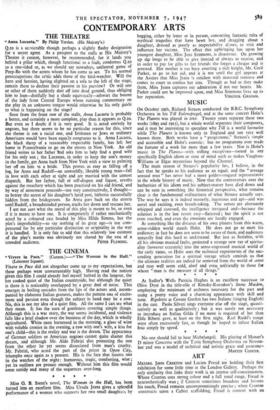MUSIC
ON October 29th, Richard Strauss conducted the B.B.C. Symphony Orchestra in his Till Eulenspiegel, and at the same concert Hoist's The Planets was played in tow. Twenty years separate these two works (1895 and 1915), but a whole world separates their composers, and it may be interesting to speculate why Till is a world favourite while The Planets is known only in England and not very well known there. Both works have a " programme," Strauss's simple and accessible and Hoist's esoteric: but no programme ever made the fortune of a work for more than a few years. Nor is Hoist's music in The PLmets—with trifling exceptions—rooted in any specifically English idiom or state of mind such as makes Vaughan- Williams or Elgar mysterious beyond the Channel.
-The main reason of Strauss's popularity lies, I believe, in the fact that he speaks to his audience as an equal, and the " average sensual man " has never had a more golden-tongued representative in the whole history of music. Now that the controversies over the barbarities of his idiom and his subject-matter have died down and can be seen in something like historical perspective, what remains clear is the fundamental ordinariness of what Strauss actually says. The way he says it is indeed masterly, ingenious and apt—and was novel and exciting, even breath-taking. The senses are alternately whipped and caressed, the intelligence intrigued and—because the solution is in the last resort easy—flattered ; but the spirit is not even touched, and even the emotions are hardly engaged.
At something like the distance of his own planets from this warm, sense-ridden world stands Hoist. He does not go to meet his audience; in fact he does not seem to be aware of them, and audiences naturally find this hard to understand. But just as Scriabin, with all his obvious musical faults, projected a strange new ray of spiritu- ality (however eccentric) into the sense-engrossed musical world of the early 19oos, so Hoist uses the technical experiments of the suc- ceeding generation for a spiritual voyage which reminds us that the ultimate realities are indeed far removed from the world of sense and may well seem cold, aloof and even unfriendly to those for whom " man is the measure of all things."
At Sadler's Wells Patricia Hughes is an excellent successor to Olive Dyer in the title-role of Rimsky-Korsakov's Snow Maiden, employing the minimum of archness necessary for the part and using a pretty voice and a charming appearance with skill and taste. Rigoletto at Covent Garden has two Italians (singing English) in the cast. Paolo Silveri sings everyone else off the stage, quanti- tatively as well as qualitatively ; but it was surely not necessary to introduce an Italian Gilds if no more is required of her than Elda Ribetti gave, at least on the first night. Karl Rankl's tempi were often excessively fast, as though he hoped to infuse Italian brio simply by speed.
* * * * No one should fail to hear Michelangeli. His playing of Mozart's D minor Concerto with the Tarin Symphony Orchestra on Novem- ber 2nd was a model of technical and artistic grace and assuranco- MARTIN COOPER.


































 Previous page
Previous page